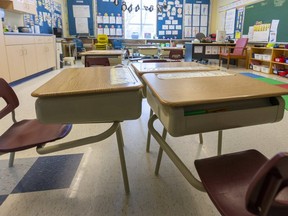'COVID slide' persists as pandemic learning gaps remain unfilled: Expert
Some called it the COVID slide. Others refer to it as learning loss from the pandemic.

Article content
Some called it the COVID slide. Others refer to it as learning loss from the pandemic.
After two years of teaching turmoil due to the COVID-19 pandemic, Ontario school boards have been tasked with bridging the learning gaps among their students with tutoring programs designed to help them catch up.
But despite the Ford government claiming it has made a “historic investment” to help kids get back up to speed, including a $200 to $250 payment per child for private tutoring, many say it just isn’t enough and an opportunity for equity may have been missed.
“We haven’t seen as much investment as we should. There was a small tuition program, but that was finished by end of December in 2022,” said Western University associate professor Prachi Srivastava, an expert in education and global development.
Srivastava said she fears the problem “will not be remedied in a timely way.”
“Frankly, I think the time for that is quickly passing and what we will end up seeing are some inequities . . . because we haven’t seen a concerted plan of action,” she said.
Learning loss is more prevalent in children coming from lower income brackets, she said.
“That’s true across the board regardless of the country,” she added.
Parents who can afford it are being drawn to private tutoring and what is known as “shadow education,” she said.
From March 2020 to May 2021, Ontario schools were closed to in-person learning for 20 weeks, longer than any other Canadian province or territory. The following school year was also filled with disruptions that varied across the province and from school to school.
To fix the learning gap, the provincial government has delivered what it says is the “largest publicly-funded tutoring expansion program in Ontario history.”
The initiative ensures students are catching up on core subjects, including reading, writing and math, according to Grace Lee, spokesperson for the Education Ministry.
It’s a plan Wilfrid Laurier University law professor Kelly Gallagher-Mackay, who is also an education activist, has called “flawed.”
Understanding the pandemic’s fallout in education has been challenging because of little hard data and the way the tutoring is delivered by various school boards, she said.
“It’s really a mishmash,” Gallagher-Mackay said. “It’s not an effective pandemic recovery strategy.”
Some boards have contracted out all their funds to private tutoring firms such as Kumon and Oxford Learning, while others hired their own teachers to do the extra work. Some have a combination of both.
“Boards have been scrambling to develop ways of spending short-term money provided at the last minute,” Gallagher-Mackay said. “The responsibility for this program design has come from the ministry. While I think there have been better or worse boards . . . boards were given just seven to eight weeks to get tutoring programs up and running on a large scale.”
Intensive tutoring, several times a week, is what is needed to make a real difference in a child catching up, she said.
Karolin Alkerton, a former Ontario teacher who runs a private online tutoring service, says parents flocking to her for help are “upset” and “frustrated.”
More and more parents come with concerns their child is falling behind, she said.
“What I’m getting from parents is . . . in a lot of cases they are not happy with what the schools come up with,” she said. “They say there is no one-to-one (tutoring) and no one is working on the strategies and the foundations.”
“In a lot of cases what the schools are doing is not enough. It’s not bridging those gaps.”
As well, a lot of parents are not aware of “the little bit support the government threw in there for . . . outside sources for tutoring,’ she said.
Her comments are echoed by Ontario NDP education critic Chandra Pasma, an Ottawa MPP.
“Kids are really struggling after three years of pandemic disrupted learning. They are all over the board with where they are at and what supports they need,” she said.
“They are also all over the map in terms of mental health.”
She balks at the small government payout for tutoring that give kids for “an hour or two of extra support.”
“Instead of investing in support in the classroom that would make sure all kids are catching up and getting supports, the government went with the private alternative, investing in private tutoring and writing cheques to parents,” she said.
The London-area public and Catholic school boards did not immediately respond to a request for a comment.








Postmedia is committed to maintaining a lively but civil forum for discussion. Please keep comments relevant and respectful. Comments may take up to an hour to appear on the site. You will receive an email if there is a reply to your comment, an update to a thread you follow or if a user you follow comments. Visit our Community Guidelines for more information.